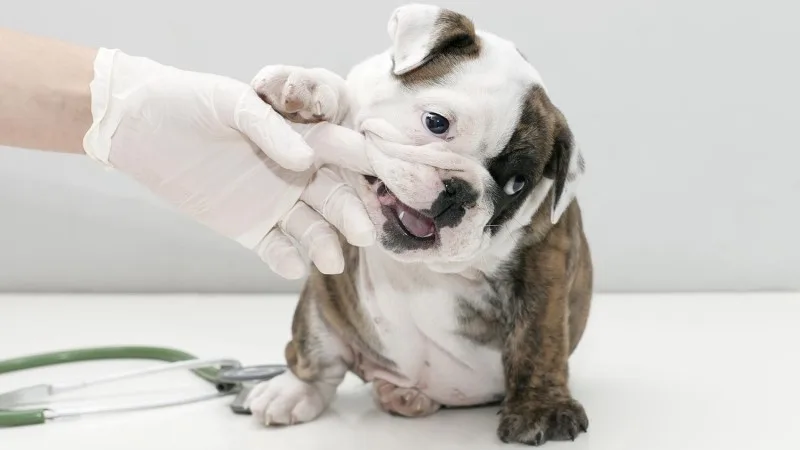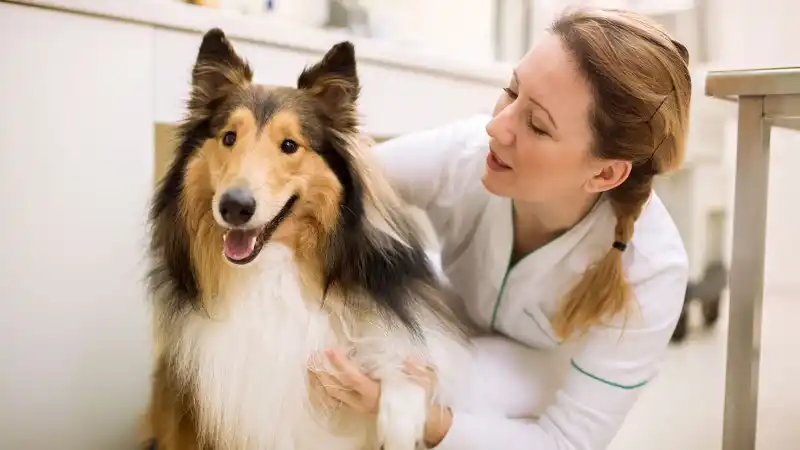Your Puppy's First Vet Visit
Learn more about what to expect at your puppy’s first vet visit. Read about questions to ask the vet to lead your pup to good health and wellness success.

You’re a few days away from picking up your new puppy, and everyone is too excited to sleep. You have a new leash, collar, toys, and a crate, but what are you forgetting? Have you scheduled your puppy’s first vet visit yet?
It may seem early, but your puppy should head to the vet during the first week at their new home. It is your responsibility to keep your puppy in top shape, and your veterinarian can help establish the guidelines for success.
First Puppy Vet Visit
Finding the Right Vet
One of the best ways to find a veterinarian is to ask friends, neighbors, or even someone you see walking their dog or at the dog park for a local vet recommendation. You can even use social media to ask neighbors where they take their pets.
Finding a clinic near home is convenient for picking up supplies or emergency visits. You can also call a few clinics and check their websites for vital information, such as hours, how they handle emergencies, services they offer, and other criteria that may be important to you. The American Animal Hospital Association’s hospital locator tool is another excellent resource for pet owners struggling to find the right vet in their area.
Some clinics allow you to fill out new client information forms online. Their website may provide information for new puppy owners about the paperwork required for their first vet visit. The recent vet shortage is causing some challenges for pet owners to find vets and nearby clinics, so do your research.
Make a Checklist for Your Pet's First Vet Visit
When you make your appointment, the customer service representative or vet technician will tell you what items to bring to the first vet visit. In general, veterinarians will need a copy of your puppy’s medical records and relevant paperwork from the breeder, shelter, or rescue organization. Also, bring any medications your puppy is on, as your breeder may recommend a flea or heartworm medication. It’s possible there are drug contraindications and what your puppy is taking may no longer be necessary.
Part of your checklist should include the following information:
Record of vaccinations from the breeder
Any medical records from the breeder
Brand of food you’re currently feeding
Record of dewormings
As you gear up for the trip, don't forget to prep your dog for travel, so the car ride to their first veterinary visit is a positive experience. For example, bring a comfortable blanket or their crate... and plenty of treats.

Every Dog and Cat Deserves the Pet Insurance of Champions
Get prize-winning care for your pets.
What Happens at a Puppy’s First Visit?
There are some standard procedures to expect during the first visit. A head-to-tail wellness exam will be done by the vet and vet technician. Your vet team will also use treats to ensure the experience is positive, as they want your puppy to enjoy being there.
The exam will include:
Taking the puppy's vital signs (temperature, heart rate, and respiratory rate), getting their weight, and discussing diet and general well-being (activity level, appetite, and any problems you may have experienced).
A comprehensive physical exam, including listening to the heart and lungs, palpating the abdomen, and conducting an oral exam.
The vet will also check your dog’s mouth, ears, eyes, nose, and toes, as well as the skin and coat. They will also recommend core vaccinations and deworming medications for future visits.
Questions to Ask Your Veterinary Team During the Head-to-Tail Exam
Your veterinarian is the best person to ask health-related questions about your new puppy. Their job is to ensure your dog is healthy, so keeping you informed about how to best care for your puppy is in their best interest!
Consider the following list of questions for your pet’s first vet visit:
Questions About Your Puppy’s Core Vaccines
What vaccines does my puppy need? Core vaccines include protection against diseases such as canine parvovirus, canine distemper, hepatitis, parainfluenza, and rabies. Non-core vaccines such as Bordetella (kennel cough), Lyme disease, and canine flu vaccine recommendations will depend on risk factors such as boarding plans, exposure to dog parks, contact with ticks, and other considerations based on your geographic location.
When does my puppy need this series of vaccines? The first vaccination is given around 8 weeks, and booster shots are given every 3 to 4 weeks until about 20 weeks. It is a good idea for some miniature breed dogs to have their vaccines spaced out longer than larger dogs. Specific recommendations will depend on the age and size of your dog.
Are there possible side effects resulting from the vaccinations? For example, if there is any swelling at the vaccination site or your dog has an allergic reaction, you must return to the vet immediately.
What Are the General Care Recommendations for a New Puppy?
There are several important things every dog owner should know how to do, even if you plan on taking your pet to the groomer. Your vet will be happy to answer questions about:
Dental care and oral hygiene advice, including best methods for canine tooth brushing, appropriate chew, dental toys, and supplements, and the teething process
Best methods for cleaning dog ears and trimming toenails
Best age for a spay/neuter
Recommendations for microchipping
Possible health issues based on breed
Grooming tips
For answers to many of these questions, read Top 8 New Puppy Questions.
What Will the Vet Visit Cost?
This first visit should kick off the annual exams that occur throughout your dog’s lifetime. The average cost of veterinary care for your puppy during their first year ranges from $100 to $500. It includes the core vaccinations they’ll need, like canine parvovirus, canine hepatitis, and rabies.
You can save a few dollars on office fees by taking advantage of the AKC Veterinary Network Certificate Program. This program provides newly AKC registered puppies and dogs with a certificate for a complimentary first veterinary office visit when taken to veterinarians in their network.
Learn more about the costs of veterinary care in the first year here.
Puppy insurance is also a great way to reduce financial stress brought on by vet visits. Everyone wants their dog to be the picture of good health, but accidents and illnesses can occur even with the best care. Even diseases like canine parvovirus can be both life-threatening and expensive to treat, with care costing thousands of dollars in some cases.
Another thing for puppy owners to keep in mind is that most pet insurance companies exclude pre-existing conditions, denying coverage for injuries or illnesses that occur before a policy. AKC Pet Insurance (underwritten by Independence American Insurance Company) is the ONLY brand that offers pre-existing condition coverage after a 12-month waiting period*. Click here for a quote and create a custom plan that fits your pet and your budget.
*Not available in all states. “Only brand“ refers to comparison with 5 pet insurance carriers making up approximately 80% of the US pet insurance market (Nationwide, ASPCA, Trupanion, HealthyPaws and PetPlan).
Schedule Future Visits Before You Leave the Vet's Office
Don’t forget to schedule future visits for puppy shots before you leave the vet's office, as most vaccinations require boosters to be effective. Vaccines are generally necessary every 3 to 4 weeks until 20 weeks. Keeping your dog on a regular exam schedule for preventive healthcare is key to a long and healthy life!

Every Dog and Cat Deserves the Pet Insurance of Champions
Get prize-winning care for your pets.

Mary comes to AKC Pet Insurance with an extensive background in animal care. As a lifelong animal lover, she has a passion for promoting pet health and wellness. Mary lives in Kentucky with her orange kitty, "Cat" and her dog, " Wubbi".
READ MORE ARTICLES

